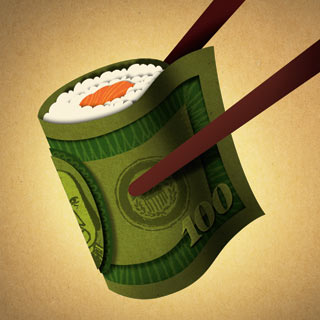
When the economist Tyler Cowen found himself in Nicaragua, looking for good local food, he didn't do what I'd have done. I would have skimmed the guidebook, picked somewhere that sounded authentic but non-intimidating, then probably have ended up in Nicaragua's equivalent of the Angus Steakhouse, along with several other Brits, all of whom I'd have regarded with silent disdain on the grounds of their being pathetic, guidebook-following tourists. Here's what Cowen did: he found an older taxi driver (older equals more experience) and asked to be driven somewhere serving "very Nicaraguan" food. As well as the taxi fare, Cowen offered to buy the driver lunch, plus pay $10 for his time. One imagines the meal might have been a bit socially awkward, but in foodie terms the tactic paid off: lunch was a "quesillo", a creamy cheese tortilla, from a cart in a tiny town he'd otherwise never have heard of. It was cheap, too – so cheap that the extra $10 didn't rival what he'd have paid for mediocre food at a city-centre restaurant aimed at tourists.
This is one of the tricks outlined in Cowen's new book, An Economist Gets Lunch: New Rules For Everyday Foodies. The "Freakonomics" approach – seeing everyday life through the lens of economic incentives – is a venerable genre, but it's rarely been done so pragmatically: Cowen's rules promise to satisfy your curiosity, stomach and wallet. At posh restaurants with short menus, he advises, order whatever sounds least appetising: it made it on to the menu for a reason, and if it did so despite sounding off-putting, it's probably great. Avoid places with crowds of beautiful women – not because they have specific culinary tastes, but because they attract male customers regardless of food quality, enabling the kitchen to coast. When picking a Chinese restaurant, cheaper is often better, but with Japanese go for the priciest you can afford; the reason has to do with the socioeconomic profiles of immigrants from those countries. And don't Google "best restaurants Edinburgh"; search instead for "best cauliflower dish in Edinburgh", whatever your views on cauliflower: specificity will lead you to good-value quality.
One broader truth that emerges is how, when it comes to many consumer choices, customers and sellers are locked in a standoff. Since you can't eat a meal before deciding whether to buy it, you must rely on what economists call "signals" – smiling diners, say, or enticing decor. (Or simply price: we tend to assume expensive means wonderful.) But that motivates restaurants to spend money on the signals – creating a lively social scene or great ambience – instead of on top-notch chefs and ingredients. "One of my fears is to come across a restaurant where the people are laughing," Cowen writes, with endearing curmudgeonliness. When you're savouring amazing food, do you grin? You do not.
Naturally, this all depends on your goals: if you care more about laughter – or beautiful women – than good food, why avoid them? But the broader point stands: second-guess yourself. "When looking for a good meal, some knowledge of social science is often more useful than a knowledge of food," Cowen argues. By all means queue for an hour at London's latest gourmet-burger hotspot, if you enjoy being part of what's in vogue. Just don't imagine you'll be getting London's best burger.
oliver.burkeman@theguardian.com; twitter.com/oliverburkeman

